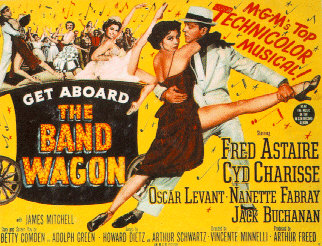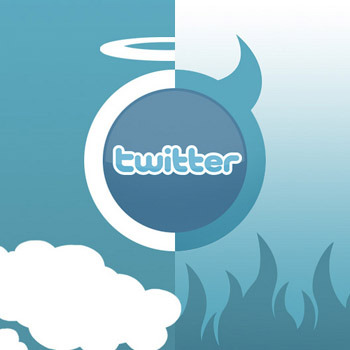
If there's one trait that applies to virtually every public relations professional I've ever met, it's a well developed sense of skepticism - and heightened bullshit radar. As PR pros, our job is to sniff out bad information and replace it with good, cogently worded information, thereby leaving one's stakeholders a little better informed and less confused than they were before. At least that the idea. While PR people are human beings with their own unique political and social baggage and inclinations, I've found people in the field to be remarkably centrist, relatively decoupled from ideological anchors and, above all, deeply skeptical of what they hear. I would further argue that you have to be in order to do your job properly.

As an undergraduate one of my most memorable classes was a philosophy course on rudimentary logic, which outlined all the typical logical fallacies that people commit. Anyone considering a career in public relations would, I think, be well advised to take a class in rudimentary logical analysis, or at least to read up on the subject. Logical fallacies are to a PR pro what turbulence is to airline pilots - something you have to learn how to negotiate.as smoothly and serenely as possible.
While some classic fallacies are easy to debunk, others are less obvious and can easily go undetected until it's too late. The latest issue of Skeptical Inquirer ran a wonderful article by Jesse Richardson on the Top 20 Logical Fallacies. The author also created a
website complete with
downloadable posters on the subject, which make for a great educational tool.
It also makes for a great drinking game. Choose 20 different poisons, assign each a number, and then turn the TV to Fox News. Take a shot for each logical fallacy committed. Trust me, you'll be horizontal and unconscious in no time.
1) Straw Man - Misrepresenting someone's argument to make it easier to attack.

Industry want to alleviate labour shortages by easing restrictions on temporary foreign workers. Union leaders respond by asking their industry counterparts why they hate Canadian workers so much that they don't want to invest in apprenticeship programs. Environmental activists express concern about a proposed pipeline project, to which the government to accuse them of trying to actively sabotage the country's economic growth. In the absence of a good argument, deliberately misinterpret the other guy's argument and go to town on it.
2) False Cause - Presuming that a real or perceived relationship between things means that one is the cause of the other.
Religious conservatives are particularly fond of this one. In the aftermath of Hurricane Katrina,
Pastor John Hagee claimed that the disaster was divine intervention directly linked to the Gay Pride event that was scheduled to take place in New Orleans on the day the hurricane hit. While it would be technically impossible to disprove this assertion, the fact that the French Quarter (the 'den of sin' where the parade was scheduled to take place) was one of the few parts of the city relatively unscathed by Katrina makes this argument more than a bit suspect.
3) Slippery Slope - Asserting that if we allow A to happen, then Z will consequently happen too.

Another favourite of the religious right, particularly when it comes to same-sex marriage, which, as well all know, will lead to rampant polygamy, incest, bestiality, drug-fueled orgies
and the wholesale collapse of our society's moral equilibrium. Somehow we've managed to stave this fate off in the eight years since same-sex marriage was legalized in Canada, but it's probably only a matter of time. Likewise, the National Rifle Association would have you believe that any attempt to place restrictions on individual ownership of firearms will herald the arrival of a North Korea-style absolutist state. Again, we appear to have slipped the gauntlet here - at least for now.
4) Ad Hominem - Attacking your opponent's character or personal traits instead of engaging with their argument.

We all have plenty of first-hand experience with this one. From childhood disputes that ultimately culminated in "Yeah, well....you're a poopy-head!" to supposedly sophisticated political debates that devolve into name-calling and occasional profanity. (Yes,
Justin Trudeau, I'm talking about you!) But more often than not it's more subtle than this. In the absence of a solid argument, organizations with an axe to grind will go after their adversary's track record for... whatever's handy, be it a reputation for opposing unions, a past association with socialist organizations, a few years in an Islamic school in Indonesia.... or whatever else serves as a convenient blunt verbal cudgel.
 5) Appeal to Emotion - Manipulating an emotional response in place of a valid or compelling argument.
5) Appeal to Emotion - Manipulating an emotional response in place of a valid or compelling argument.
The so-called 'pro-life' movement lives and breathes this fallacy. Lacking in concrete arguments, pro-lifers tend to resort to "Bbbbbut the bayyybeeeessss!!! You're killing bayyybeeeessss!!! It's a life! Why do you hate baayybeeesss?!?" The same approach is also employed by groups ranging from PETA ("Look at how cute these seals are - and how hot the models holding the placards of the cute seals are!") to Alberta's Wildrose Party ("Remember the
Alamo New Energy Policy, when Alberta was betrayed way back when! Build up that firewall!"). Just stick to the facts and bear it out - that's about all you can do.
6) The Fallacy Fallacy - Presuming that because a claim has been poorly argued, or a fallacy has been made, that the claim is necessarily wrong.
This is another one much loved by religious conservatives, and opponents of the theory of evolution in particular. 'Intelligent design' advocates are often quick to point to the infamous
Piltdown Man hoax as evidence
against evolution. Yes, it was a colossal embarrassment within certain quarters of the scientific community, but it did absolutely nothing to detract from the overwhelming body of evidence in favour of evolution by natural selection. Finding a bad apple in an orchard does not mean that you leave the entire harvest to rot.
 7) Tu Quoque - Avoiding having to engage with criticism by turning the accusation back on the accuser.
7) Tu Quoque - Avoiding having to engage with criticism by turning the accusation back on the accuser.
Also known as the Pee-wee Herman defence, this logical fallacy has defined Israel-Palestine peace negotiations since the creation of the State of Israel in 1948, as well as India-Pakistan conflicts over Kashmir and any number of other intractable geopolitical conflicts.
8) Personal Incredulity - Saying that because one finds something difficult to understand it therefore must not be true.

This is another favourite of the anti-evolution lobby. "If evolution is true, why are we not seeing animals transform into other animals? I just simply can't fathom how one species could change into another." And so on and so forth. This faulty line of argument closely parallels the notorious "
I'm confused" commercials produced in 2009 by the National Organization for Marriage (NOM) in opposition to same-sex marriage, which essentially takes the view that "It seems weird, therefore it must be wrong." The fact that something seems 'odd' or 'confusing' does constitute grounds for it being wrong. If anything, it's simply an argument for better education so that said phenomenon becomes better understood.
9) Special Pleading - Moving the goalposts or making up exceptions when a claim is shown to be false.
This is a particular favourite of professional 'psychics' whose abilities have been thrown into doubt. Alleged clairvoyant and TV psychic Sylvia Browne pleaded for public sympathy following an incident where she falsely claimed that an 11-year-old boy had been abducted and killed - only to be found alive four years later - that "I think it's cruel to jump on this one case in which I was wrong." (This was but one of several well-publicized 'mistakes' made by the multimillionaire celebrity psychic.) She also famously rebuffed the James Randi Foundation's invitation to prove her abilities empirically in exchange for a million-dollar prize, alleging that the conjurer-turned-debunker was an '
ungodly' man. In other words, you have to believe it to see it.
10) Loaded Question - Asking a question that has an assumption built into it so that one cannot answer it without appearing guilty.

Any PR practitioner with media relations training knows all about this trap. An oil company spokesperson is facing a panel of bloodthirsty journalists following an oil spill and one of them broaches a question along the lines of "Does Dweebcor make a policy of cutting corners on safety inspections of its ships or was this simply the result of negligence and poor oversight?" Take a deep breath, count to ten and stick to your messaging and your information. And if you need to drop an F-bomb, make sure you do it under your breath.
11) Bandwagon - Appealing to popularity or the fact that many people do something as an attempted form of validation.

The phrase "1 billion Chinese people can't be wrong" is as dangerous as it is false. A billion people can easily be wrong, as were the many millions of Chinese people who fell under the sway of Mao Zedong's seductive but disastrously misguided economic policies. (The country's population had yet to reach 1 billion at the time of the Great Leap Forward.) People are wrong about countless things, things which do not become any less wrong when similarly misguided individual band together in large numbers.
12) Appeal to Authority - Using the opinion or position of an authority figure, or institution of authority, in place of an actual argument.
Remember the old Camel cigarettes commercials (I certainly don't but I've seen the
archival footage)
that proudly boasted that "More doctors smoke Camels than any other cigarette"? That's an appeal to authority - if doctors like it, it
must be good. Likewise, the extraordinary success of that great mid-2000s pseudoscientific blockbuster
The Secret rested on its highly publicized blessing by Oprah Winfrey, Montel Williams and various dubious self-help gurus with impressive sounding job descriptions like 'philosopher' and 'metaphysicist' etc. Unbridled quote-mining from the likes of Gandhi, Einstein and Mother Teresa also helps.
 13) Genetic - Judging something good or bad on the basis of where it comes from or from whom it comes.
13) Genetic - Judging something good or bad on the basis of where it comes from or from whom it comes.
This is a favourite of authoritarian leaders the world over, particularly in places like Iran, Venezuela, Cuba and other countries with an antagonistic relationship with the US and its allies. Any allegations of corruption, brutality and electoral manipulation from western media are quickly shot down on the basis that the Yankee pig-dogs hate us, ergo the allegations are lies.
14) Begging the Question - A circular argument in which the conclusion is included in the premise.
How do we know that homosexuality is wrong? It says so in the Bible. And the Bible is Holy Scripture and infallible. End of argument.
 15) Appeal to Nature - Making the argument that because something is natural it is therefore valid, justified, inevitable or ideal.
15) Appeal to Nature - Making the argument that because something is natural it is therefore valid, justified, inevitable or ideal.
Echinacea is a genus of herbaceous flowering plants in the daisy family,
Asteraceae. It gives you dark urine - and that's about it. So why is the public in love with it? It's 'natural', don't you know, unlike those nasty chemical pharmaceuticals. By that same argument, black mamba venom is also good for you. In actual fact, black mamba venom is probably
more effective than echinacea in curing, say, the common cold - inasmuch as death has been shown to fix all known cold symptoms. And that
has been demonstrated emperically.
16) Anecdotal - Using personal experience or an isolated example instead of a valid argument, especially to dismiss statistics.
Last month on Brush Talk
I took Jerry Agar to task for a particularly odious article in the Toronto Sun in which he essentially accused all poor people of being lazy bums who expect to be taken care of by the system. While most of the responses I received were positive, a few individuals took the opportunity to point out instances in which people successfully raised themselves out of abject poverty through sheer determination, hard work and a modicum of luck. While I don't deny that this occasionally happens, I also don't deny that there have been people who smoked heavily their whole life and still lived into their nineties.
17) Burden of Proof - Saying that the burden of proof lies not with the person making the claim but with those who deny the claim.

There is a profoundly good reason why suspects in criminal cases are considered innocent until proven guilty, namely that it's effectively impossible to 'prove a negative'. Moreover, if the evidence simply isn't conclusive, the accused walks. While few would question the wisdom of this logic within the context of jurisprudence, this logical truism seems to go out the window. It's all fine and good for you to allege that global warming is a conspiracy of climate scientists or that the 9/11 attacks were an inside job, but it's your job to explain why - not everybody else's job to explain why not. And no, a lack of response to your allegation does
not constitute support for your side. Chances are nobody thinks it's an argument worthy of a response.
18) Ambiguity - Using double meanings or ambiguities of language to mislead or misrepresent the truth.

Also known as the "I'm A Frayed Knot" argument. Opponents of the theory of evolution love to attack 'Darwinism' on the grounds that a society defined by Darwinism (i.e. 'Social Darwinism' along the lines of Nazi-style eugenics) would be a horrible society in which to live. Aside from the obvious failure to discern 'truth' from 'that which I would wish to be true' (e.g. "It can't be raining because I wouldn't want it to be raining."), anyone who makes this argument is making the error of using two very different usages of the term 'Darwinism' interchangeably. Similarly problematic arguments have been used by opponents of doctor-assisted suicide by arguing that Hitler engaged in mass campaigns of '
euthanasia'. This is also known as 'guilt by association', of which Hitler was also a fan.
19) 'No True Scotsman' - Making what could be called an appeal to purity as a way to dismiss relevant criticisms or flaws of an argument.
Angus declares that Scotsmen don't put sugar in their porridge, to which Lachlan points out that he is Scottish and he puts sugar in his porridge. Angus then angrily accuses Lachlan of not being a 'true Scotsman'. Alas, political pundits of all stripes do this when one if their own breaks ranks on an issue. Staunch Republicans even have a
special term of those within the party considered soft on issues like gun rights and abortion as a cheap means of discrediting any internal dissent. Likewise, left-leaning intellectuals from Michael Ignatieff and Christopher Hitchens who expressed support for removing Saddam Hussein in 2003 were excoriated by many ideological purists as faux-left turncoats.
20) Black or White - Presenting two alternative states as the only possibilities when in fact more possibilities exist.

"Either you are with us or you are with the terrorists," stated US President George W. Bush in September 2001. In fact there are plenty of ways in which people could be opposed to the way in which the War on Terror was being carried out but not an actual advocate of al-Qaeda and its goals, the highly charged post-9/11 climate in which these words were spoken makes this utterance perhaps more forgivable. When it comes to Stephen Harper accusing his environmental critics of being "
enemies of the government of Canada," however, there is no such excuse. This is Orwellian demagoguery pure and simple.
Drunk yet? I sincerely hope so.




 This may or may not be a legitimate reason for being on Twitter, but it leads back to the original point about whether a) you really do have unrivalled access to certain information and can provide it better than other organizations, and b) you have the time and human resources to devote to the task. The latter point is the undoing of some organizations that leap into Twitterstan before thinking through what they hope to achieve with it. And the trouble with establishing yourself as a source of first resort on anything is that people come to expect this of you - and failing to deliver the goods in this regard will do far more damage to your organization's reputation than not being on Twitter in the first place ever could.
This may or may not be a legitimate reason for being on Twitter, but it leads back to the original point about whether a) you really do have unrivalled access to certain information and can provide it better than other organizations, and b) you have the time and human resources to devote to the task. The latter point is the undoing of some organizations that leap into Twitterstan before thinking through what they hope to achieve with it. And the trouble with establishing yourself as a source of first resort on anything is that people come to expect this of you - and failing to deliver the goods in this regard will do far more damage to your organization's reputation than not being on Twitter in the first place ever could.






























